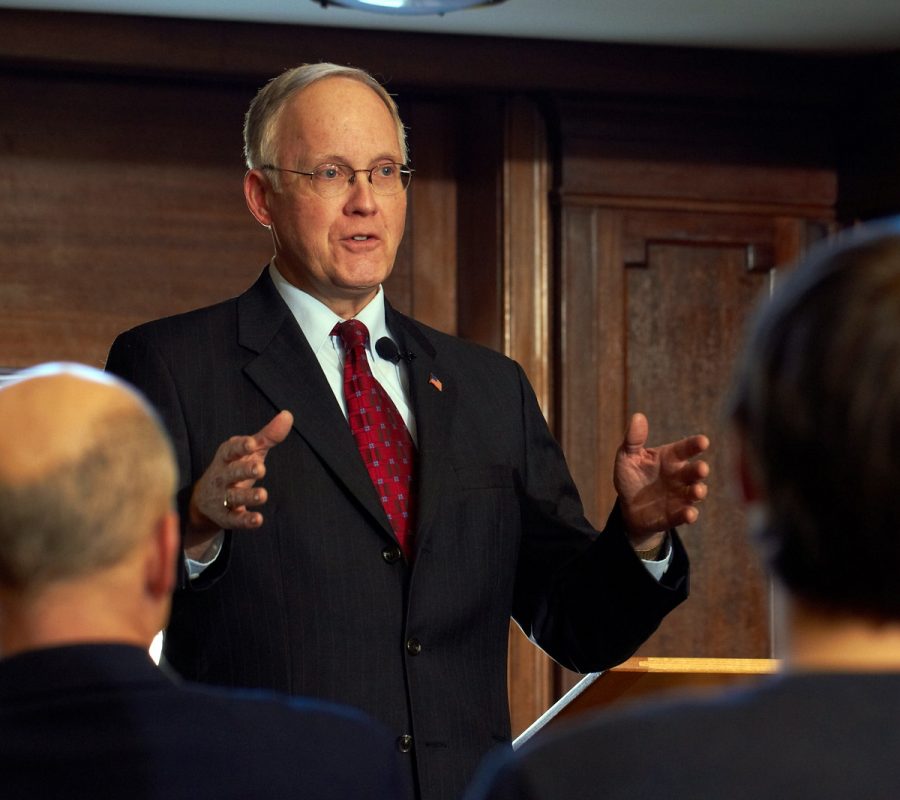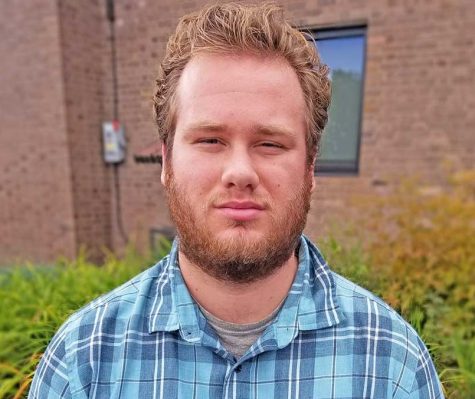Former governor speaks of a life in public service
Jim Douglas
Former Vermont Governor Jim Douglas visited Bill Doyle’s American Politics and Government class on Oct. 31 to talk to students about his long political career that took him from being a campus Republican activist in the 1960’s to four terms as governor of his adopted state.
As he told the class, Douglas is not a native Vermonter. “I wasn’t born here, I was born in western Massachusetts and came to Middlebury College and never left,” he said. “I still live in the town of Middlebury and married a local girl there and commuted to Montpellier during the decades I worked there and served in state government.”
His college years at Middlebury College helped guide him towards his life in Vermont politics.
“I caught the bug and became interested in politics and became Young Republican chairman my junior to senior year at Middlebury,” Douglas said. “I didn’t know what I wanted to do when I grew up and there was an open legislative seat in Middlebury, so I decided to run for it. I had a mentor named Dick Snelling, who was at that point just a former legislator and active in the state Republican party, and he said, ‘I’m planning to go back to the Legislature in 1972, why don’t you come? It will be fun!’ So I ran that fall and was successful and served three and a half terms. Then, midway through my fourth term, Snelling, who had progressed from the House to the governorship, asked me to become his executive assistant, which I did.”
In 1980, Douglas moved on to serve 12 years as Vermont’s secretary of state before launching an unsuccessful bid in 1992 for the U.S. senate. “I guess I was two years ahead of my time because in ‘94 there was an anti-incumbent wave across the country, but not in ‘92,” he said. “I decided to come back and run for state treasurer, which I won and served eight years, and then the governorship for eight years after that.”
When asked about disappointments as a four-term governor, Douglas recalled a particularly difficult budgetary fight with the Legislature in 2009, which resulted in his veto being overridden
“It was a fiscal reality of 2009 when I vetoed a budget that was eventually overridden by the Legislature by a single vote,” he said. “One of the Democratic members was vacationing in Greece and they had to entice him to cut his vacation and vote to override my veto, and I thought they just increased their carbon footprint and went to tremendous lengths to inconvenience this fella to bring him home. My concern was that the Legislature passed a budget that raised taxes and increased spending in a way that was just not sustainable, and I hate to say I told them so. I think subsequent budgetary challenges have lent some truth to that. Every year we see the Legislature struggling with a huge shortfall initially and figuring out a way to close that, and for every year since I left — until this year — they have done it by increasing taxes in some way.”
Douglas went on to say he felt the fiscal attitudes in the Legislature are shifting, a welcome development. “This year was the first year in a long time that the state’s budget increased no fees, no taxes,” he said. “I think that is a real testament to the new governor but also to the new Legislature’s understanding that…there’s a limit for what Vermonters can do at a time where our population is stagnant or shrinking and our economy is very soft. So I guess my greatest disappointment is we saw a budget pass a year before I left that [I thought] was unsustainable.”
Douglas said that one of the main reasons why he ran for Vermont governor was an awareness that the employment situation in Vermont was growing worse.
“We had bumper stickers that said ‘Jim equals jobs’ because we had, in 2002, significant layoffs at IBM in Essex Junction, our largest private employer at the time,” he said. “They had just laid off over a thousand people and it was a reminder that Big Blue wasn’t forever and it wasn’t a lifetime guaranteed job for folks. It became obvious that the economy was less reliable over the long term and more fragile, and that unemployment was more of a problem than perhaps it seemed. So that was my theme, and I felt it had to be the focus of my efforts and those of the Legislature during the coming years.”
As for politics today, Douglas said he felt things had changed in undesirable ways. The past practices of bi-partisanship, he said, have pretty much disappeared on the national scene, something he found troubling.
“It’s very polarized, more so down there [in Washington D.C] than it is up here [in Vermont],” he said. “Interestingly enough, there is also these tensions within each party. We got a president tweeting insults to senior senators of his own party, and on the other side… in the Democratic party, Hillary Clinton won’t give up and we have the Sanderistas trying to take over. I think there is a lot of conflict within each party and polarization between them. It isn’t really a satisfying time. In Vermont, I usually describe it as better than that, but not as good as it used to be. I kind of long for the 70s when Senator Doyle and I were chairs of the same committee, and we didn’t have the same party line votes I see in Montpellier each day,” he said. “It was much more collegial, we have much more commuters to the Legislature now and I think that’s a problem. I’m not completely serious, I get that people need to do what works best for their families, but at one point I said, ‘we shouldn’t have built the interstates’ because you can live in Franklin County and be in Montpellier in under an hour. We need more socializing and collegiality because I think if you get to know somebody, you wouldn’t be whacking them in a speech on the legislative floor.”




